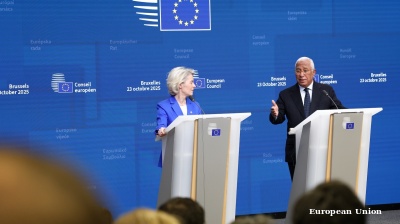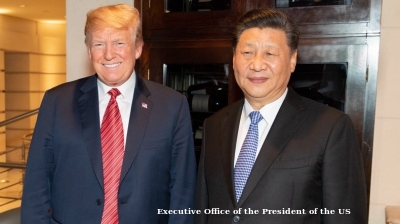“I won!” was the gleeful reaction by Ukrainian oligarch Ihor Kolomoisky to the news that a Kyiv court ruled that the 2016 nationalisation of his PrivatBank was illegal.
"The grounds for such a decision by the District Administrative Court of Kiev were, among other things, the failure of the defendants to prove the existence of a basis for qualifying PJSC CB PrivatBank as insolvent, as a result of, which the procedure for its nationalisation was subsequently initiated and the procedure itself was violated the nationalisation of the bank, the order of, which is regulated at the legislative level," the court said in a statement as cited by NV Biznes.
The decision by the court caused an immediate backlash by Ukraine’s donors who see the nationalisation of the bankrupt bank as a major victory in the drive to reform the country and end the endemic corruption.
"In 2016 Ukraine’s international partners supported the decision of the government and the National Bank of Ukraine (NBU) to nationalise PrivatBank, at the request of former owners, as the only effective method of protecting the bank’s depositors... It is important that the authorities continue their efforts to recover losses from former owners and related parties of failed banks. Ukraine’s international partners will be closely monitoring developments in this area," the US embassy said in a statement after the announcement.
PrivatBank was nationalised after a bne IntelliNews cover story “Privat investigations” revealing the high level of related party loans caused such a scandal the National Bank of Ukraine (NBU) took the bank over a month later in December 2016.
An NBU audit found almost 100% of the bank’s loans were made to shell companies connected to, or controlled by, the shareholders, leaving a $5.6bn hole in the balance sheet. The NBU then bailed the bank out to the tune of $5bn – the biggest bank rescue in Ukraine’s history.
However, Kolomoisky, who lives in self-imposed exile in Israel, has been fighting the authorities to regain control of the bank, or at least recover $2bn in capital he claims was in the bank at the time of its nationalisation.
Ukraine’s courts are famously corrupt and illiberal. In February the Ukrainian Constitutional Court caused a scandal by cancelling criminal responsibility for illicit enrichment of the country's officials. The court believes that criminal responsibility for such wrongdoing violates the presumption of innocence. International donors immediately condemned the decision as backtracking on Ukraine’s commitment to fighting corruption, but the decision has stood and the National Anti-Corruption Bureau of Ukraine (NABU), the country's main anti-graft body, has since fully or partially closed 63 cases related to illegal enrichment of government officials as a result of the ruling.
Former NBU governor Valeriya Gontareva, who oversaw the PrivatBank takeover, said that Kolomoisky would face criminal charges if he did not pay back at least some of the $5bn looted from PrivatBank by August 2017, but in the end nothing happened.
As bne IntelliNews has argued in an op-ed “Corruption is the system” Ukraine’s politicians are reluctant to end corruption as they are all exposed to prosecution and in lieu of working institutions, corruption is the most effect lever for exercising political power.
Both the central bank and the ministry of finance, two of the most liberal institutions in Ukraine’s government, said they would appeal against the decision by the court to return PrivatBank to its former owners.
Head of the Claims Department of the Legal Department of the National Bank, Viktor Grigorchuk, said that the decision will be appealed by the National Bank, the regulator’s press service reports.
"We will continue to prove the legality of the actions and decisions taken by the regulator in the appeals instance. Once again we draw attention to the fact that the legal uncertainty generated by court decisions undermines financial stability," he said.
The National Bank added that the decision will harm Ukraine’s international image. The regulator will propose to the Financial Stability Board to contact the National Security Council and the Cabinet of Ministers regarding such judicial practices.
“The international partners of Ukraine have repeatedly stressed that nationalisation of PrivatBank was an important step to ensure financial stability. The decision to withdraw an insolvent PrivatBank with state participation was taken in accordance with current legislation, supported by the NSDC and the Government of Ukraine to ensure financial stability and preserve citizens' funds. The legality of the decisions is obvious and the reverse procedure in this matter is impossible, because for this there is neither legal nor economic grounds. After the withdrawal of the insolvent bank from the market with state participation, PrivatBank completely switched to the market business model and today is the most profitable Ukrainian bank and part of a stable and transparent banking system,” the central bank said in a statement.
The results of an independent investigation by Kroll indicate that PrivatBank was subject to large-scale and coordinated fraud for at least 10 years prior to its nationalisation, which caused the bank losses of at least $5.5bn .
“As the former shareholders of the bank did not fulfil their obligations to financially improve the bank, which they personally assured in their written request, the National Bank declared PrivatBank insolvent and appealed to the government to acquire ownership of the bank’s shares,” the NBU concluded.
Kolomoisky denies any wrongdoing and says the bank was forcibly nationalised without proper justification.
The decision could have political repercussions on the presidential elections, which come to a conclusion with the second round of voting on April 21. Frontrunner and comic Volodymyr Zelenskiy has personal and business ties to Kolomoisky and has been accused of being a puppet of the oligarch. Rumours that Zelenskiy might return PrivatBank have been swirling for months and according to some analysts Kolomoisky has been rushing the court decision through in order to get a ruling before Zelenskiy takes over as president in order to keep a political firebreak between him and a decision to return the bank to its former owner.
If PrivatBank is returned to Kolomoisky then Tim Ash, senior sovereign strategist at BlueBay Asset Management, says that would be a “deal breaker” for the IMF and its $3.8bn stand-by agreement, which could plunge Ukraine back into crisis.
News
_1761305900.jpg)
Latin America edges up growth forecasts but remains trapped in low gear, ECLAC says
Latin America and the Caribbean will expand 2.4% this year, the Economic Commission for Latin America and the Caribbean said, marking the second upward revision since April but pointing to the region's struggle to escape chronically weak growth.

Palestinian ambassador pledges Iraqi embassy in Jerusalem
Palestinian ambassador pledges to open Iraqi embassy in Jerusalem as Iraq lays foundation stone for Palestinian ambassador's residence in Baghdad's new diplomatic quarter covering 300 hectares.

EU pledges ongoing support for Ukraine, defers decision on Russian assets
European Union leaders pledged continued financial backing for Ukraine over the next two years, but delayed a decision on tapping billions of euros in frozen Russian assets to fund Kyiv’s defence

Trump Administration striving to strike critical minerals deal with Kazakhstan
Pushing for US firm to win rights to develop major tungsten deposits.



